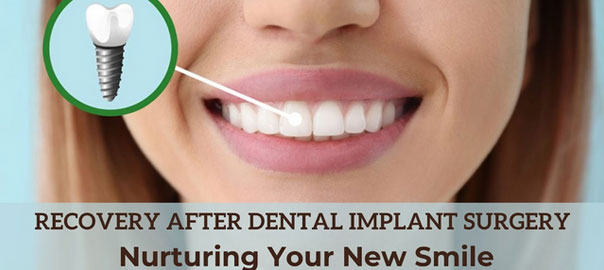
Recovery After Dental Implant Surgery: Nurturing Your New Smile
Dental implant surgery is an excellent advancement in modern dentistry: a reliable, long-lasting restoration for missing teeth. This transformative procedure offers the permanent solution to replace missing teeth, enhancing both your oral health and confidence. Although the surgery is such an important milestone, your ability to recover will determine the success of your dental implants.
This guide will bring to you the most important aspects of post-operative care, offering tips for the best care regarding your new smile during recovery. We shall guide you from pain and swelling management to nutritional diets and give you practical advice through which you can enter this phase painlessly.
Patiently and diligently is what this key for your healing path entails. The suggestions above will set you up on the right platform for healing with an excellent, long-lasting smile. So let’s start taking a step into those necessary actions that would make your experience following dental implant surgery easy and success-driven.
Recovery after Dental Implant Surgery
Proper care and attention are crucial in ensuring a smooth recovery from dental implant surgery. Adhering to the following guidelines can contribute significantly toward healing while protecting your investment:
- Pain management: Swelling, bruising, and pain are common within the first couple of days after the procedure. Your dentist may give you an oral painkiller or recommend an over-the-counter option to take. Applying ice on the affected area will also help in reducing swelling.
- Oral Hygiene: The patient should be told to maintain good oral hygiene. The patient should brush around the surgical site with a soft-bristled toothbrush and gentle motion. The patient should brush teeth twice a day and avoid interdental flossing at the site of the implant until your dentist instructs you to.
- Diet and Nutrition: For several days, a soft diet is maintained with slowly progressive progression toward solid food that is tolerated. Hot and spicy foods are avoided; brushing over the edge of an implant to cause irritation is also avoided. Proper nutrition and vitamins and minerals will enhance the healing process.
Potential Risks and Complications
Although generally safe, dental implant surgery can also cause some risks and complications. These may include infection, bleeding, nerve damage, implant failure, or sinus problems on the upper jaw. Most can be avoided by following through on your dentist’s instructions and keeping up on appointments as well as asking any questions that have begun to niggle.
Infection Prevention Preventing infection is critical for successful implant integration and an uneventful course of healing. The following are guidelines for the prevention of infection:
- Antibiotics: Antibiotics are often prescribed by your dentist before and after surgery to prevent bacterial infection. Take the antibiotic, even if you feel perfectly fine, so that you have ample protection.
- Oral Rinse: Use an antimicrobial oral rinse swabbed over your mouth as recommended by your dentist. Rinse gently enough not to irritate the surgical area. Brush around the implant gently on the same side as your teeth, using a soft-bristled toothbrush. Pay extra attention to the abutment and the crown, making sure that food particles and plaque have no chance of accumulating around the implant.
- Avoid Smoking and Alcohol: Smoking and alcohol can delay healing, which again leads to a chain of further infections. The only cure for this case is to abstain from smoking and alcohol for sometime.
- Follow-up Appointments: You should always attend the scheduled follow-up appointments with the dentist. He would check on your post-procedure progress, remove stitches if necessary and answer whatever queries you may have.
Resolve Complications Seldom complications may develop after dental implants. Of importance is to know when the complications are arising and prompt dental care is needed. Some of the complications, including their treatment, are:
- Infection: Symptoms include pain that may be persistent, swelling, redness, or discharge around the area of the implant. See your dentist at once if you have any suspicion of infection. Your dentist will prescribe some antibiotics or a proper cleaning to remove this infection.
- Failure of Implant: This is a rare condition in which the bond between the implant and bone fails to take place or may work loose sometimes. The dentist will evaluate the case and may suggest replacing the implant or referring the patient to remove it and later replacing it with a new one.
- Nerve Damage: Numbness, tingling or altered sensation of the lips, tongue, or chin is the sign of nerve damage. In such cases, visit your dentist. Most nerve damage is temporary; however, it has to be treated promptly to ensure proper management. Dental implant surgery might be just what the doctor ordered to bring your smile and your dental function back.
Knowing all the steps and preparing yourself ahead of time, combined with proper care afterward, can ensure a very successful outcome. Do not forget to emphasize good oral hygiene, the possibility of risks, and steps to seek professional attention if there are complications.
Leave a Reply
Leave a Reply
Explore More Similar Posts
Explore More Blogs


Leave a Reply